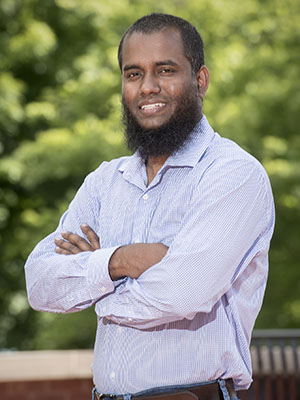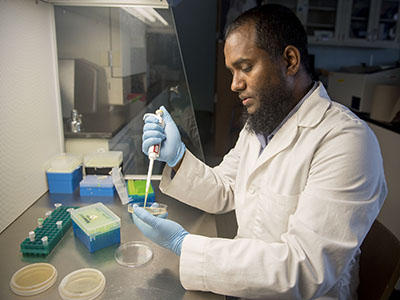Mahbubur Rahman
Meet Mahbubur Rahman
Mahbubur Rahman came to ETSU in 2012 to pursue his Ph.D. in biomedical sciences after earning his undergraduate and master’s degrees at the University of Dhaka in his native country of Bangladesh, where his mother, four brothers and two sisters still live. He quickly became acclimated to ETSU and the Johnson City area, and soon won statewide accolades for his work in helping fellow international students and others. Rahman has given presentations on his research both at ETSU and nationally, and he has co-authored articles that have been published in prestigious journals. He plans to defend his dissertation this month and graduate in August, after which he hopes to enter a post-doctoral fellowship and establish a career as a teacher and researcher. Rahman’s wife is pursuing her doctoral degree in biochemistry at Virginia Tech, and they have a 15-month-old daughter.
Tell us a bit about your early life and education in Bangladesh.
My father was a schoolteacher. He always taught that I can do better because I can
understand science very easily, and he started to educate me. In my country, we have
some scholarships for good students, and when I was in the seventh grade, I had the
opportunity to start in a cadet college. I studied there six years. During 12th grade, I finished 13th out of 120,000 students, and then I started university and studied biochemistry and
molecular biology in both undergraduate and master’s. 
As I grew up in my village, I was always taught to work with crops and plants. I asked how we can get more food in limited plants, because I saw the sufferings of people from very closely in the village. During my master’s time, I worked on a project in collaboration with the University of California-Davis. During the summertime, we have a very hot temperature, and so many people suffer from diarrhea and cholera, so this (International Center for Diarrheal Disease Research) was built for that treatment. It has many labs and projects they’re working on in collaboration with other countries, like the USA, Japan and some European countries. I worked on a project searching for a biomarker for human zinc status. That was a clinical trial, so we supplemented people with zinc and tested how it affected the serum level of zinc before the meal and then after the meal.
My advisor there guided me to go to the U.S. for my Ph.D. and to become an independent researcher. I wanted to come to the USA because the graduate education system in the U.S. is the best.
What have you enjoyed most about ETSU?
It is not a big school, and the people – I enjoy them the most. The people are very nice. Honestly speaking, I don’t feel that I’m out of my country, because I’ve got so many friends. One of the beautiful things when I came here was I had a host family that took care of me for one week and showed me around. People are very friendly, and you can get any help from anyone, so you do not feel you are out of your family. The weather is very good, and it’s a green city, with several hiking places.
In 2016, you won the Harold Love Outstanding Community Service Award from the Tennessee Higher Education Commission. Describe the work you have done to help your fellow international students and others during your time here.
When I was in Bangladesh, I worked with community service and volunteer service, working for people in affected areas, and also working for the older people and those who were suffering during the wintertime. So when I came here, the host family helped me a lot, and the Christian Student Fellowship helped me a lot, too, to get my groceries and get adjusted to the community. I was thinking if we could start a platform where international students could come and share their stories and get help from each other. One day, a friend and I were taking lunch and talked about this, and she made a plan. So at the Christian Student Fellowship, every Friday night, we gather and make food and Indian chai. One person from each country will tell their story and culture. We play games, and we talk and solve problems. And every first and third Saturday, people will give “taxi” rides to international students, to go to Walmart or Kroger. We also work with poor people, and we have a fund for those who need medical treatment. Sometimes we clean yards for those who cannot. Besides this, I work with the Bangladeshi community to help people get apartments.
I also work with interfaith religions, giving talks, and I was president of the Muslim Student Association for one year. We invited students from Milligan College and did a potluck. Almost 35 students came, and we had a good time talking about religion and how to fill that gap between us. I have talked about my religion at many churches. So I always try to find the similarities between the religions so we can make a good community and a strong bond with each other.
 What is your primary research focus?
What is your primary research focus?
Avocado is a very, very nutritious food. I’m working on avocados – what factor is making this a very nutritious food? I am working with Dr. Aruna Kilaru, and we are trying to unlock the mystery of avocado fruit. We collected avocados from different places, like Mexico and California, and we are doing some biochemical analysis to find which factor determines the nutritional value. Within the last four years, we discovered the key factor determining this, and we published a couple of journal articles and now we’re trying to publish in another journal. We are also collaborating with the USDA, which is working with us and other universities; they are taking our idea and trying to translate it into other crops, so we can make healthy oil for human consumption. The numbers of people are increasing, so we have to find more sources of vegetable oil for human consumption, because plant oil is always good compared to animal oil. That’s our main goal – to unlock the mystery of avocado and translate it into other organisms to get the oil.
What’s next, now that you’re completing your Ph.D.?
I want to do research, and I also want to teach. I taught some courses here, including the undergraduate biochemistry lab and main courses. So now I am looking for a post-doctoral position, hopefully at Virginia Tech, because my wife is there, and then I will go for a faculty position. I will try to find this in the USA. If not, maybe I will go to another country or back to my country, but I want to be a teacher. The U.S. is my first priority, but it is very competitive.
What are some of the things you enjoy in your spare time?
I’ve actually played many things during my Ph.D. time. I like hiking, because this area is good for hiking, and I play soccer, cricket and volleyball. Our Biomedical Sciences became two-time intramural champions in volleyball, and I like swimming also. And I listen to music. From my own culture, there’s some folk music I like, called Baul music. I also like jazz music.
 Stout Drive Road Closure
Stout Drive Road Closure